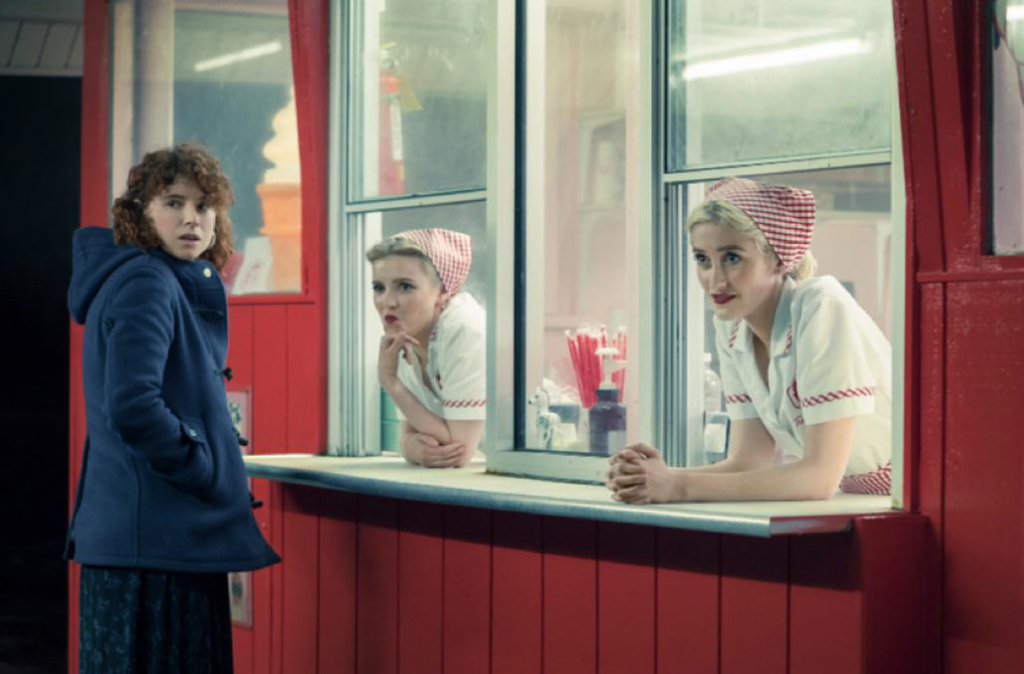★★☆☆☆
“I’m Thinking of Ending Things” reminds the viewer at every turn that it is a Charlie Kaufman film. Written, directed and produced by the man known for his freaky plots and meta conclusions, “I’m Thinking of Ending Things” is chaotic, disjointed and intricate to the point that it becomes discouraging.
Much unlike Kaufman’s other works, however, it is questionable whether whatever this film really means is worth the analysis and doubtful that there is actually all that much genius to be found.
Describing the plot of “I’m Thinking of Ending Things” is difficult, mostly because the film has little sense of linear progression. Rather, it is a bizarre amalgamation of symbols that reappear often enough to make the audience recognize they must have some significance, but do not linger long enough for the audience to make any sense of them.
The psychological drama begins with a woman’s visit to meet her boyfriend’s parents at their farmhouse for the first time, a move reminiscent of other eerie thrillers like “Get Out.” The relationship is just one of many different things the films’ characters are thinking of ending.
In the first 15 minutes or so, the viewer might feel as though they have a grip on the reality of the movie’s world. The young woman (Jessie Buckley) — who is either named Lucy, Lucia, Louisa, Ames or none of the above — narrating her thoughts appears to be the familiar emotionally detached girlfriend struggling to see a future with her partner, more definitively named Jake (Jesse Plemons). Jake appears insecure and at least somewhat aware that his girlfriend is drifting away from him.
Of course, everything the viewer thinks they know about the couple — and time, space and everything else in this fictional world — quickly unravels, though that is about as much information as one can offer without fear of running into spoilers. All the while, interspersed scenes of an aging high school janitor gradually become central to the story and divert attention away from the woman who introduced the film.

“I’m Thinking of Ending Things” adapts the 2016 novel by Iain Reid that received generally positive reviews for its suspense but was criticized for falling into gimmicky plot devices and wrapping with a too convenient ending. With Kaufman’s script, an almost opposite problem arises: The ending, and the buildup to that ending, is devoid of almost any cohesion, though the gimmicks still abound.
The mind-bending plot and focus on identity is on-brand for Kaufman, who wrote “Eternal Sunshine of the Spotless Mind” and directed the similarly weird “Synecdoche, New York.” But in “I’m Thinking of Ending Things,” Kaufman toes the line between keeping viewers invested in seeing the mystery resolve itself and discouraging them from engaging with his esoteric details.
One yearns for all the oddities — a haunting scratched door, the supposed smell of varnish in an ice cream shop, a series of missed calls with cryptic voicemails left on the woman’s phone — to come together in a moment of realization and relief of the built-up tension. Yet viewers should not hold their breath; as the plot builds, so does the audience’s sense of disappointment.
Viewers are granted no relief from the film’s bombardment of new sources of confusion. Even if the viewer comes to a convincing conclusion about the meaning of the film, whether from their own musings or from search results for “I’m Thinking of Ending Things explained,” there is far too much of the film that remains unaddressed, random or pointless. It seems as though Kaufman asked himself how many cliches of psychological dramas and horror he could stuff into the film and went with every single one he could think of, even if the symbolism of those tropes is largely irrelevant.
Looking past the faults of the plot while watching is difficult, but all the acting performances are impressive and demonstrate great versatility; after all, the script is written so that each actor must take on at least three different personas for their ever-changing characters.
Buckley’s dynamic performance as the young woman has the audience juggling concern for her well-being and skepticism of her reliability. It is surprising to discover that Buckley is an Irish actress, as she plays the presumably American young woman with such ease. Plemons also impresses as he skillfully portrays the internally troubled yet unsettlingly outwardly calm boyfriend. Toni Collette’s portrayal of Plemons’ mother is reminiscent of her role as the mother in “Hereditary” and is just as well-executed, with even the smallest of movements and gestures indicating her limited mental stability.
If there is anything comprehensible about this film, it is likely the mood established by the changing settings. There is the stuffiness of Jake’s weary van, the palpable chillness of the snowstorm combined with the chill of the movie’s events and Jake’s antique-filled childhood home that lives in multiple time periods — and not only because of its dated decor — so the film does deliver in a purely visceral sense.
Undoubtedly, fans and critics are praising the film’s boundless potential for interpretation, perceiving the film as a moving puzzle that offers more and more mind play with each rewatch. To anyone else, however, a tweet quoted by Aisha Harris, host of NPR Pop Culture Happy Hour, summarizes the film best as “a movie to pretend to like if you’re dating a guy who’s studying film.”
However many rewatches it takes to get a grip on what “I’m Thinking of Ending Things” says, the reality is that most viewers will be too unimpressed the first time around to give the film whatever patience is required to internalize Kaufman’s latest conclusion about the human psyche.




















